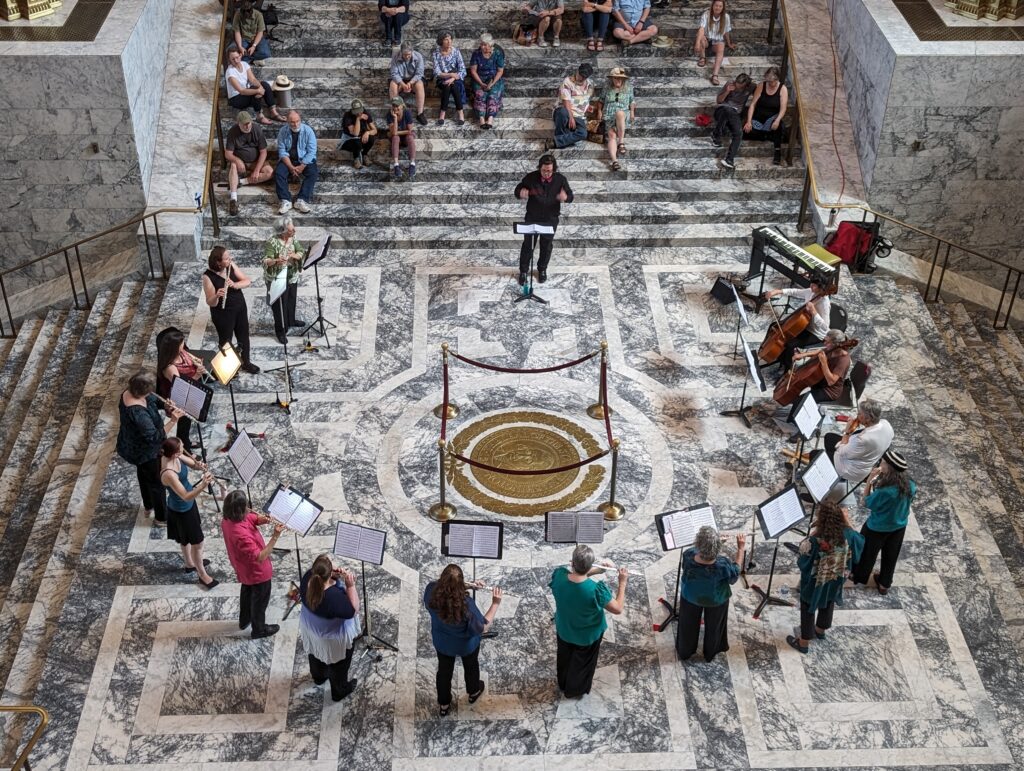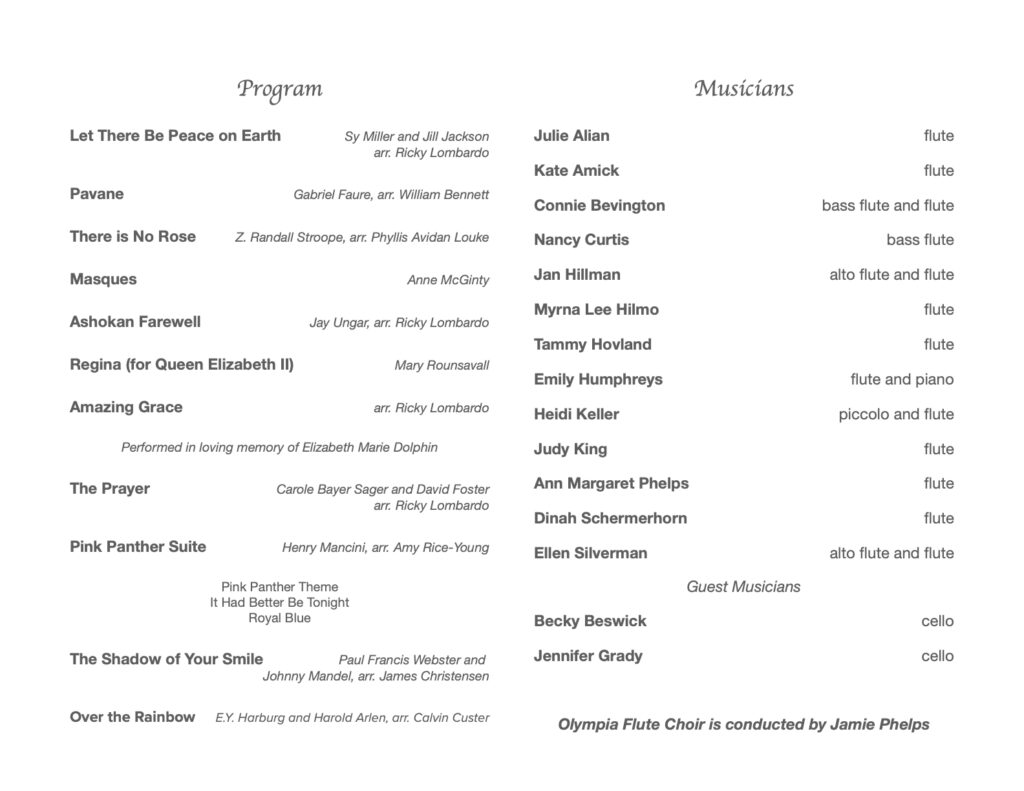
Thanks to everyone who supported us with their attendance and kind words!

Thanks to everyone who supported us with their attendance and kind words!
Join us for our Mother’s Day concert at the Capitol Rotunda, Sunday, May 12th, 2024 at 1:30pm. Our concert is free and open to the public.

Program notes:
Let There Be Peace on Earth, by Sy Miller and Jill Jackson, arr. Ricky Lombardo, was written in 1955 to be sung by a diverse choir of high school students at a retreat in Long Beach, CA. Although it was not intended to be a Christmas song, it is often performed during the holiday season.
Pavane, Op. 50, by Gabriel Faure, was composed in 1887, and was originally a piano piece. Faure reworked it for orchestra and chorus after deciding to dedicate the piece to his patron, countess Élisabeth Greffulhe. The countess’ cousin wrote the choral verses. Titled after a slow Spanish processional dance, Faure described it as, “elegant, assuredly, but not particularly important.” This seems somewhat comical now, as Pavane has become one of Faure’s most performed and beloved works.
There is No Rose, by Z. Randall Stroope, arr. Phyllis Avidan Louke was arranged for flute choir from Stroope’s original choral piece for two sopranos, one alto, piano and oboe. In this arrangement, the hauntingly beautiful line originally written for oboe is scored for piccolo. The original choral piece was written as a gift to the well known treble choir Bel Canto by its conductor, Z. Randall Stroope, using a 15th century anonymous text that beautifies the personage of the Virgin Mary. Stroope is a well-known American composer, whose mentors studied under Nadia Boulanger, who famously mentored Aaron Copeland, arguably the greatest American composer. The influence of this lineage is apparent in Stroope’s crafting of this piece, particularly in the shape of the melodic lines and broad, open harmonies. Louke’s arrangement is dedicated to Portland’s Rose City Flute Choir, and was premiered by the ensemble in April 2004.
Masques, by Anne McGinty, was composed in 1989 and was inspired by a form of festive courtly entertainment in the 16th and 17th centuries that included music, dancing, singing, acting, and elaborate stage designs. The piece features a dark and mysterious opening, followed by a lively dance. Anne McGinty is one of the most prolific female composers of concert band literature, and holds the distinction of being the first woman commissioned to compose for the United States Army Band.
Ashokan Farewell, by Jay Ungar, arr. Ricky Lombardo. Composer Jay Ungar grew up in New York listening to and performing folk music, and founded the Ashokan Fiddle & Dance Camps in 1980. Ashokan Farewell was inspired by his work with this project and gained immense popularity when it was used as the theme for the Ken Burns PBS Documentary, The Civil War.
Regina (for Queen Elizabeth II), by Mary Rounsavall, a recent composition penned for Queen Elizabeth II, was originally scored for four pianos, and then arranged by the composer for a variety of small ensembles. The lovely melody is sure to leave an impression on the listener!
Amazing Grace, arr. Ricky Lombardo, has possibly one of the longest origin stories of any hymn. The verses were written by John Newton and published in 1772. Newton had lived a variety of experiences in his life before becoming a clergyman and abolitionist, including service in the Royal Navy and later involvement in the Atlantic slave trade. The text of Amazing Grace was written after Newton’s spiritual conversion. In 1835 it was set to an existing tune, New Britain, by American composer William Walker. It is well-known as a Christian, secular, spiritual, and folk tune.
The Prayer, by Carole Bayer Sager and David Foster, arr. Ricky Lombardo, was recorded separately by Celine Dion and Andrea Bocelli for the 1998 film Quest for Camelot. The song later appeared in duet form on the performers’ individual albums and went on to win several awards for best original song.
Pink Panther Suite, by Henry Mancini, arr. Amy Rice-Young was composed in 1963 for the comedy film, The Pink Panther, in which Inspector Jacques Clouseau chases after an international jewel thief. The original soundtrack contains 12 tracks, the most recognizable of which today remains the Pink Panther Theme.
The Shadow of Your Smile, by Paul Francis Webster and Johnny Mandel, arr. James Christensen, is also known as the Love Theme from The Sandpiper, a 1965 film starring Elizabeth Taylor and Richard Burton. The song went on to become somewhat of a hit for Tony Bennett and won the Grammy Award for Song of the Year in 1966.
Over the Rainbow, by E.Y. Harburg and Harold Arlen, arr. Calvin Custer, was composer for the 1939 film The Wizard of Oz, where it was performed by Judy Garland. The composers often worked on songs together, and most of the other songs for The Wizard of Oz were complete by the time they started on Over the Rainbow. Harburg envisioned the song as “a ballad for a little girl who…was in trouble and… wanted to get away from… Kansas. A dry, arid, colorless place. She had never seen anything colorful in her life except the rainbow”. He wanted the melody to feature long and broad lines, which Arlen created beautifully, initially scrawling the outline on a bit of manuscript paper he’d carried around in anticipation of an idea coming to him. This jazzy arrangement preserves the original melody while adding lovely embellishments.